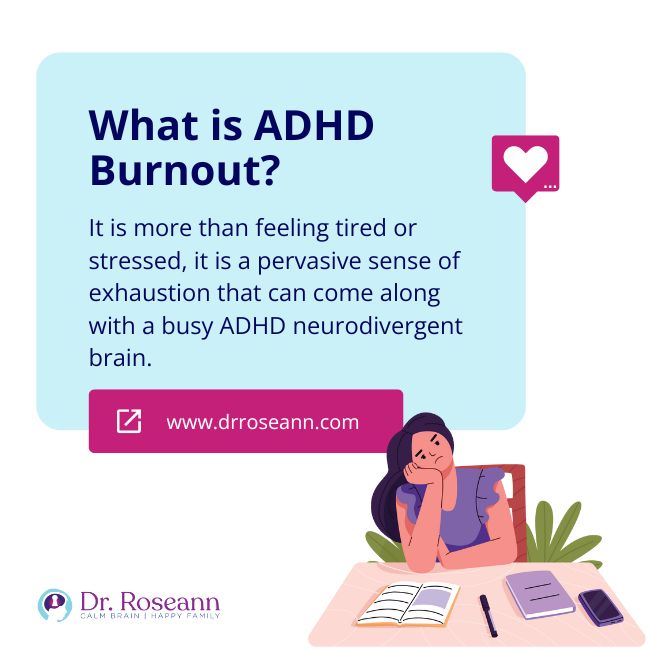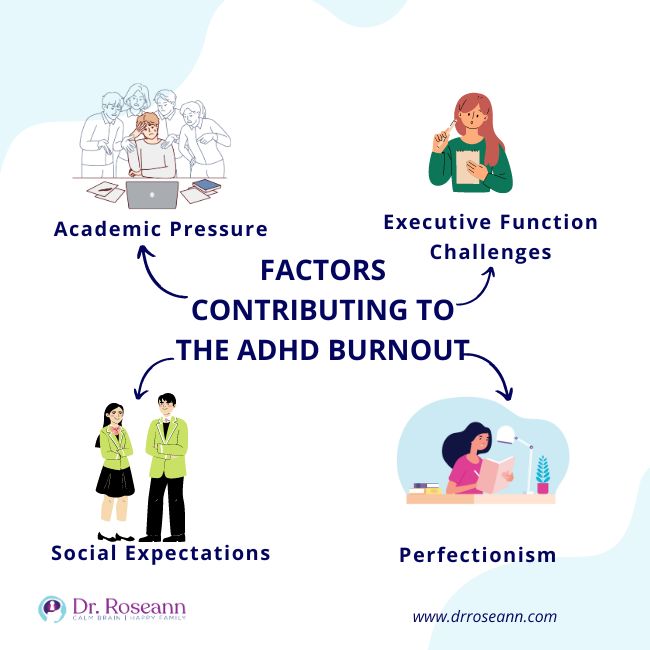Attention Deficit Hyperactivity Disorder (ADHD) is often associated with symptoms like hyperactivity and impulsivity ADHD also brings forth challenges like emotional dysregulation and executive function deficits.
One significant but often overlooked aspect of ADHD is burnout – a state of mental, emotional, and physical exhaustion resulting from chronic stress. People with ADHD are more prone to burnout because of what I like to say, “Leave too many tabs open in the brain.” That means their neurodivergent brain doesn’t always turn off, leading to an overactive nervous system.
What is ADHD Burnout?
ADHD burnout is not simply feeling tired or stressed. It's a pervasive sense of ADHD exhaustion that can profoundly impact one's functioning and well-being.

Imagine trying to juggle multiple balls in the air simultaneously, all day, every day. Children with ADHD face similar challenges as they struggle to manage their attention, impulsivity, and emotions while keeping up with daily tasks and responsibilities.
This reminds me of Sarah, now a college student, sharing her experiences with ADHD. I remember her saying, “I used to think I could push through anything. But the constant pressure of keeping up with coursework, social commitments, and managing my ADHD symptoms eventually took its toll. I hit a point where I couldn't even get out of bed in the morning.”
Sarah’s story isn’t an uncommon one. Burnout is something I see not only in my clinical practice but with my corporate clients as well.
ADHD and Brain Fog
ADHD, brain fog, and burnout form a challenging trifecta for individuals grappling with attention deficit hyperactivity disorder. Brain fog, a common symptom characterized by mental haziness and difficulty concentrating, exacerbates the already taxing nature of ADHD, often leading to burnout – a state of physical, mental, and emotional exhaustion.
For those with ADHD, brain fog intensifies the struggles associated with managing symptoms like impulsivity, disorganization, and forgetfulness. Simple tasks become arduous, and maintaining focus becomes an uphill battle against the foggy veil clouding their cognitive clarity. As a result, individuals may find themselves expending excessive mental energy just to stay afloat, eventually leading to burnout as their cognitive reserves become depleted.
The cycle of ADHD, brain fog, and burnout is vicious and self-perpetuating. Burnout further impairs cognitive function, exacerbating brain fog and deepening the sense of exhaustion. This downward spiral can have profound consequences on various aspects of life, from academic and professional performance to mental and emotional well-being.
Factors Contributing to the ADHD Burnout Cycle and How to Handle Them

One study that 52% of individuals on long-term sick leave were judged to have PTSD and 24% to have ADHD (Brattberg, 2006). Teens and college students with ADHD are particularly vulnerable to burnout due to various factors. Here are what causes burnout and how to address them properly.
1. Academic Pressure
The demands of schoolwork, exams, and deadlines can overwhelm individuals with ADHD, leading to stress and burnout. To address academic pressure and mitigate ADHD burn out among teens and college students, implement time management skills. Prioritization techniques and creating a structured study environment are essential.
Additionally, fostering self-advocacy, encouraging healthy coping mechanisms, and promoting a growth mindset can help students manage stress, improve academic performance, and prevent burnout.
2. Executive Function Challenges
Difficulties with planning, organization, and time management make it challenging for individuals with ADHD to stay on top of their responsibilities. Handle executive function challenges and mitigate ADHD burnout by breaking tasks into manageable steps and utilizing organizational tools.
Fostering flexibility, providing accommodations, and promoting self-awareness can help children, teens, and young adults with ADHD manage their responsibilities more effectively and reduce the risk of burnout.
3. Social Expectations
Maintaining social relationships while managing ADHD burnout symptoms can be draining, especially for teens and college students navigating peer dynamics and social activities. Establishing clear boundaries, prioritizing self-care, and seeking supportive social networks can help.
Encourage open communication, set realistic expectations, and foster self-acceptance in your child. You’ll be able to navigate social interactions more successfully and reduce stressors and ADHD chronic fatigue contributing to burnout.
4. Perfectionism
Many individuals with ADHD struggle with perfectionism, setting unrealistic standards for themselves and experiencing heightened stress when they fall short. Perfectionism can be addressed by promoting a growth mindset, emphasizing progress over perfection, and reframing setbacks as opportunities for learning.
Encouraging self-compassion, setting realistic goals, and celebrating small achievements can help children and teens with ADHD manage perfectionistic tendencies and reduce the risk of burnout.
After several sessions with Sarah, she now shares how seeking support transformed her experience. “Once I started getting therapy and talking to my teachers about my ADHD and the challenges I was facing, it made a world of difference. I was able to manage my workload and avoid ADHD burnout.”
ADHD burnout is a significant concern for teens and college students, impacting their academic performance, mental health, and overall well-being (Bae et al., 2019). Recognizing the signs of burnout and implementing proactive strategies allows people with ADHD to better manage their symptoms and thrive in their academic and personal pursuits.
Ways to Combat ADHD Burnout
The ADHD brain has many assets but parenting through the challenges can be hard. That is exactly why I created The Natural ADHD Focus Formula Kit, so parents can get guidance from a professional that has worked with thousands of children and families.
Getting accurate information and having a clear path to support your child’s strengths and needs is what this amazing resource is all about. Get started today with the Natural ADHD Focus Formula Kit.
What does ADHD burnout feel like?
Physically, ADHD burnout may feel like a heavy weight on the body, with individuals experiencing fatigue, lethargy, and physical tension. Mentally, it can manifest as cognitive fog or mental exhaustion, making it difficult to concentrate, think clearly, or make decisions. Emotionally, burnout often leads to feelings of frustration, overwhelm, and even despair as individuals struggle to keep up with responsibilities despite their best efforts.
How to treat ADHD fatigue?
Treating ADHD mental fatigue typically involves a combination of lifestyle modifications such as maintaining a regular sleep schedule and engaging in regular physical exercise and stress management techniques like mindfulness meditation or deep breathing exercises. Consulting with a healthcare provider or mental health professional is essential to develop a personalized treatment plan tailored to individual needs.
Does ADHD cause fatigue?
While ADHD itself may not directly cause fatigue, the symptoms and challenges associated with the disorder, such as difficulty concentrating, impulsivity, and hyperactivity, can lead to mental and physical exhaustion over time. Managing ADHD symptoms effectively through therapy and lifestyle modifications can help alleviate fatigue and improve overall energy levels.
How to get out of ADHD burnout?
To recover from ADHD burnout, individuals should prioritize self-care by getting adequate rest, engaging in activities that bring joy and relaxation, and seeking support from loved ones or mental health professionals. Gradually reintroducing structure and routine into daily life while setting realistic goals and boundaries can also help prevent future burnout episodes.
Is getting overwhelmed easily a sign of ADHD?
Yes, getting overwhelmed easily can be a sign of ADHD. Having ADHD and being overwhelmed results in issues with executive function, particularly in managing time, organizing tasks, and regulating emotions. These kids find it challenging to cope with a high volume of stimuli or demands, leading to feelings of overwhelm.
How to cope with ADHD?
Coping with ADHD involves implementing strategies such as establishing routines, breaking tasks into smaller steps, and seeking support from therapists or support groups. Additionally, lifestyle changes such as regular exercise and adequate sleep can help manage symptoms effectively.
What are ADHD triggers?
ADHD triggers can vary widely among individuals but often include factors like stress, lack of structure or routine, sensory overload, and sleep deprivation. Identifying personal triggers and implementing strategies to manage them, such as mindfulness techniques or organizational tools, can help individuals with ADHD better navigate their symptoms and reduce the likelihood of experiencing difficulties.
Can ADHD make you tired?
Yes, ADHD can contribute to feelings of tiredness or fatigue due to the constant mental effort required to manage symptoms such as impulsivity, hyperactivity, and difficulty maintaining attention. Additionally, sleep disturbances and co-occurring conditions like anxiety or depression are commonly associated with chronic fatigue and ADHD.
Procrastination is what stage of burnout?
Procrastination can be a contributing factor to ADHD and burnout. It often occurs during the early stages of burnout when individuals begin to feel overwhelmed by their responsibilities and struggle to maintain productivity. However, procrastination can also exacerbate burnout by increasing stress levels and creating a cycle of avoidance and increased workload.
Can stress make ADHD worse?
Yes, stress can exacerbate symptoms of ADHD. Increased stress levels can impair executive function skills such as attention, organization, and impulse control, making it more challenging for individuals with ADHD stress to manage their symptoms effectively. Additionally, stress can trigger emotional dysregulation and exacerbate co-occurring conditions like anxiety or depression, further impacting overall well-being.
Can ADD get worse with stress?
Yes, ADD and stress can worsen over time. Stress can impair cognitive functioning and exacerbate difficulties with attention, impulsivity, and hyperactivity in individuals with ADD. Additionally, stress can lead to increased emotional dysregulation and exacerbate symptoms of anxiety or depression, further impacting overall functioning. For this, ADD coping skills are necessary.
How to stop zoning out with ADHD?
To stop zoning out with ADHD, try engaging in stimulating tasks, setting external cues like alarms or timers, and practicing mindfulness techniques to increase awareness and focus. Creating a structured environment and seeking support from a therapist or ADHD coach can also help develop personalized strategies to manage zoning out effectively.
What helps ADD burnout?
Effective strategies for managing ADD and chronic fatigue include therapy and lifestyle modifications. CBT can provide coping skills and support. Other ways to cope with ADD include lifestyle modifications such as regular exercise, adequate sleep, and organizational techniques.
How to get energy with ADHD?
To boost energy after bouts with ADHD or burnout, prioritize regular exercise and maintain a balanced diet to provide sustained energy throughout the day. Additionally, ADHD and low energy can be mitigated by a consistent sleep schedule and practicing stress management techniques to improve overall energy levels and well-being.
How to beat ADHD?
Beating ADHD involves a multifaceted approach that includes therapy and lifestyle modifications. Work with healthcare professionals to develop personalized strategies tailored to your child’s needs, focusing on managing ADHD burnout physical symptoms effectively and improving overall quality of life.
How long does ADHD burnout last?
The duration of ADHD burnout can vary widely depending on individual factors such as stress levels, coping mechanisms, and support systems. In some cases, burnout may last for a few days to weeks, while others may experience a longer time to achieve ADHD burnout recovery that requires ongoing management and support.
Is lack of motivation a sign of ADHD?
Yes, a lack of motivation can be a sign of ADHD. Individuals with ADHD low motivation often struggle with executive function skills, which can affect their ability to initiate and sustain motivation for tasks that require sustained attention or effort. This difficulty with motivation can manifest as procrastination, avoidance of tasks, or a pattern of starting projects but not completing them.
Citations
Bae, E. J., Kim, E. B., Choi, B. R., Won, S. H., Kim, J. H., Kim, S. M., Yoo, H. J., Bae, S. M., & Lim, M. H. (2019). The Relationships between Addiction to Highly Caffeinated Drinks, Burnout, and Attention-Deficit/ Hyperactivity Disorder. Journal of the Korean Academy of Child and Adolescent Psychiatry, 30(4), 153–160. https://doi.org/10.5765/jkacap.190015
Brattberg, G. (2006). PTSD and ADHD: underlying factors in many cases of burnout. Stress and Health, 22(5), 305–313. https://doi.org/10.1002/smi.1112
Dr. Roseann is a mental health expert in ADHD who frequently is in the media:
- She Knows 11 Products Moms of Kids With ADHD Swear By to Maintain Order in the Chaos
- The Healthy 12 Silent Signs of Adult ADHD You Might Be Ignoring
- Seeme & Liz 12 Essential Parenting Tips For Kids with ADHD
Always remember… “Calm Brain, Happy Family™”
Disclaimer: This article is not intended to give health advice and it is recommended to consult with a physician before beginning any new wellness regime. *The effectiveness of diagnosis and treatment vary by patient and condition. Dr. Roseann Capanna-Hodge, LLC does not guarantee certain results.
Are you looking for SOLUTIONS for your struggling child or teen?
Dr. Roseann and her team are all about science-backed solutions, so you are in the right place!
Grab your complimentary copy of
147 Therapist-Endorsed Self-Regulation Strategies for Children: A Practical Guide for Parents
Dr. Roseann is a Children’s Mental Health Expert and Licensed Therapist who has been featured in/on hundreds of media outlets including The Mel Robbins Show, CBS, NBC, PIX11 NYC, Today, FORBES, CNN, The New York Times, The Washington Post, Business Insider, Women’s Day, Healthline, CNET, Parade Magazine and PARENTS. FORBES called her, “A thought leader in children’s mental health.”

She coined the terms, “Re-entry panic syndrome” and “eco-anxiety” and is a frequent contributor to media on mental health.
Dr. Roseann Capanna-Hodge has three decades of experience in working with children, teens and their families with attention-deficit hyperactivity disorder (ADHD), autism, concussion, dyslexia and learning disability, anxiety, Obsessive Compulsive Disorder (OCD), depression and mood disorder, Lyme Disease, and PANS/PANDAS using science-backed natural mental health solutions such as supplements, magnesium, nutrition, QEEG Brain maps, neurofeedback, PEMF, psychotherapy and other non-medication approaches.
She is the author of three bestselling books, It’s Gonna Be OK!: Proven Ways to Improve Your Child's Mental Health, The Teletherapy Toolkit, and Brain Under Attack. Dr. Roseann is known for offering a message of hope through science-endorsed methods that promote a calm brain.
Her trademarked BrainBehaviorResetⓇ Program and It’s Gonna be OK!Ⓡ Podcast has been a cornerstone for thousands of parents facing mental health, behavioral or neurodevelopmental challenges.
She is the founder and director of The Global Institute of Children’s Mental Health, Neurotastic™Brain Formulas and Dr. Roseann Capanna-Hodge, LLC. Dr. Roseann is a Board Certified Neurofeedback (BCN) Practitioner, a Board Member of the Northeast Region Biofeedback Society (NRBS), Certified Integrative Mental Health Professional (CIMHP) and an Amen Clinic Certified Brain Health Coach. She is also a member of The International Lyme Disease and Associated Disease Society (ILADS), The American Psychological Association (APA), Anxiety and Depression Association of America (ADAA) National Association of School Psychologists (NASP), International OCD Foundation (IOCDF).
© Roseann-Capanna-Hodge, LLC 2024










